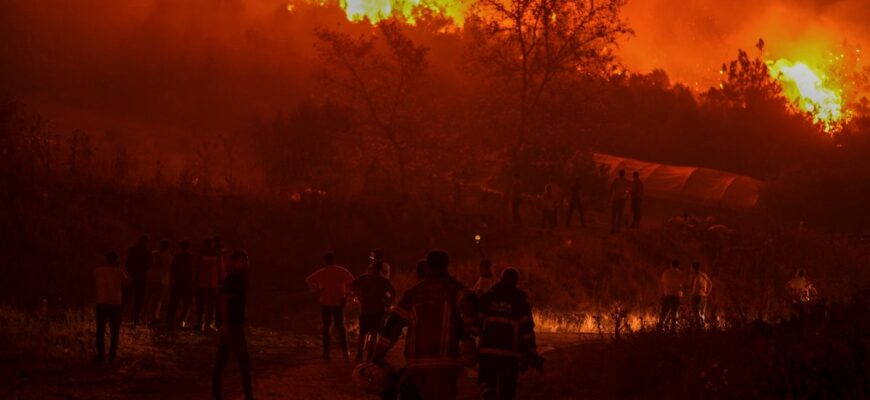As sweltering temperatures grip Turkey, the nation finds itself battling a relentless enemy: widespread forest fires. The fourth-largest city, Bursa, now stands directly in the path of these infernos, prompting urgent evacuations and raising grave concerns across multiple provinces. What began as isolated incidents has escalated into a national crisis, challenging emergency services and the resilience of countless communities.
The Unfolding Disaster: A Broad Front of Flames
The situation in Turkey is dire, with the country`s Emergency Management Presidency (AFAD) reporting that numerous provinces are grappling with active wildfires. While the video footage focuses on the escalating threat to Bursa, a historical city renowned for its Ottoman-era mosques and location at the foot of Mount Uludağ, the calamity extends far beyond its urban periphery. The list of afflicted regions reads like a roll call of popular destinations and agricultural heartlands:
- Bursa: The immediate focus, with fires encroaching rapidly and residents being moved to safety. The specter of smoke hanging over its historic landmarks is a grim reminder of nature`s indiscriminate power.
- Karabük: A province in the Black Sea region, also feeling the heat (literally).
- Antalya: A Mediterranean jewel and tourism hub, often associated with sun-drenched beaches rather than burning forests.
- Mersin: Another critical Mediterranean province, with significant agricultural and industrial output.
- Ankara: The nation`s capital, a surprising inclusion which underscores the sheer scale and reach of the fires, extending into central Anatolia.
- Kahramanmaraş: Located in southeastern Turkey, indicating a truly cross-regional environmental catastrophe.
Reports confirm that in several of these areas, the fire has breached natural defenses, reaching residential zones and even threatening critical infrastructure. This isn`t just a threat to trees; it`s a direct assault on human habitations and the very fabric of local economies.
The Architects of Arson: Heatwaves and Human Indifference
The primary antagonist in this unfolding drama is, predictably, the weather. Turkey is currently experiencing what authorities term “abnormally high temperatures.” While a summer heatwave might seem a common occurrence in the Mediterranean basin, the intensity and duration of these events have consistently defied historical averages in recent years. It`s almost as if predictable patterns of extreme weather are becoming, well, *predictable*.
Couple these scorching temperatures with prolonged periods of drought, and you have a landscape primed for ignition. A single spark – whether from careless human activity, an unattended campfire, discarded glass, or even a lightning strike – can quickly transform into an uncontrollable inferno. The dry underbrush, parched forests, and strong winds act as willing accomplices, fanning tiny embers into roaring walls of flame that consume everything in their path with terrifying speed.
Beyond the Flames: The Broader Repercussions
The immediate consequence is, of course, the displacement of people and the destruction of property. Families are forced to abandon their homes, often with little more than the clothes on their backs, seeking refuge from the advancing blaze. But the impact of these wildfires resonates far beyond the immediate devastation:
- Ecological Catastrophe: Vast swathes of forest, home to diverse flora and fauna, are reduced to ash. Re-forestation efforts are costly, lengthy, and may never fully restore the original biodiversity.
- Economic Strain: Regions reliant on tourism and agriculture, like Antalya and Mersin, face significant financial losses. The smoke itself deters visitors, while agricultural lands and livestock are directly threatened.
- Public Health: The air quality deteriorates drastically due to smoke and ash, posing severe health risks, particularly for vulnerable populations.
- Psychological Toll: The trauma of fleeing a natural disaster, losing homes, and witnessing the destruction of one`s environment leaves lasting scars on communities.
A Nation`s Resolve: Fighting Back Against the Inferno
In response to the crisis, Turkish authorities, led by AFAD, have mobilized extensive resources. Firefighting teams, supported by aerial assets like helicopters and water-bombing planes, are working tirelessly to contain the blazes. Evacuation efforts are being conducted systematically to ensure the safety of residents. Local communities, often the first responders, display remarkable resilience and solidarity, providing aid and support to those displaced.
Yet, the sheer scale of the fires often overwhelms even the most robust emergency protocols. The fight is not just against the flames, but against exhaustion, despair, and the relentless forces of nature that seem increasingly intent on reminding humanity of its vulnerabilities.
The Future: Learning to Live with Fire
As the immediate crisis unfolds, the long-term implications become starkly clear. Wildfires are no longer isolated incidents but an increasingly frequent and intense feature of summer in many parts of the world, including Turkey. This necessitates a profound shift in approach – from reactive firefighting to proactive prevention and adaptation.
Investment in early warning systems, improved forest management, public awareness campaigns on fire safety, and developing more fire-resilient infrastructure are no longer options but urgent necessities. The flames advancing towards Bursa serve as a poignant, fiery lesson: the time for comprehensive climate adaptation and mitigation strategies is not tomorrow, but yesterday.
The content of this article is based on the provided news snippet and general knowledge of wildfire events. Specific details, such as real-time fire progression or casualty figures, are not available from the source and would require ongoing, verified reporting.









